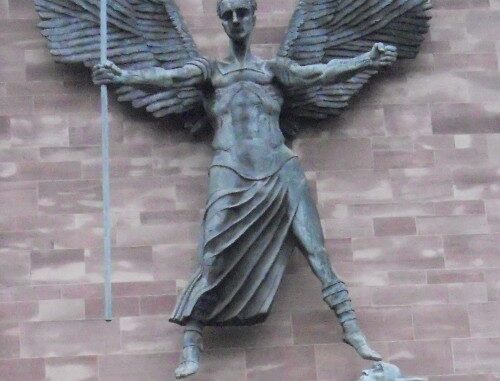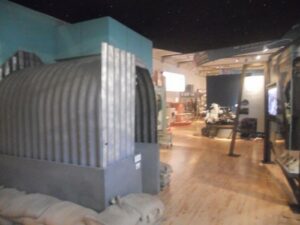
Next time you are looking for an educational and historic day out, look no further than the medieval city of Coventry.
History and Religion
Coventry is the second largest city in the Midlands, and originates back to the Roman times of AD70, with the Lunt Fort that was built in Baginton, and from then on became home to selection of monasteries, as well as Leofric the Earl of Mercia and his wife, the Legendary Lady Godiva, who is said to have rode naked through the streets on horseback, to prevent Leofric from raising the people’s taxes. The city’s clergy were twinned with Lichfield, and religion played a very important part in the city. Along with the Bishop’s seat, the monasteries of the Carmelite Whitefriars and Franciscan Greyfriars were also built, but these were both dissolved during Henry VII’s dissolution. Coventry’s three main churches are the famous St Michael’s church, which was designated as the Coventry Cathedral in 1918, Holy Trinity Church, and the much-painted St John the Baptist Church. The city is still known as ‘The City of Spires,’ which is named so because the the spires of St Michael’s Church, Holy Trinity and Whitefriars can still be seen as you come into Coventry and from its surrounding areas, today. And although the city wall that enclosed and defended Coventry from 1534 was demolished by Charles II in 1662, the remaining Whitefriars Gate is still standing.
What to see and do in the city today
Today, Coventry boasts a varied array of shops, restaurants, bars, nightclubs, coffee shops and museums, as well as a few hidden historic gems, and of course its famous Cathedral.
For shoppers, the city centre is full of well-known high-street brands stretching from Next, H&M and New Look in the Lower Precinct to Debenhams and Marks and Spencer in West Orcahrds. Cathedral Lanes, City Arcade and Medieval Spon Street also host a variety of bespoke wedding, jewellery, and toy shops, as well as The 4th of July American Shop, which sells all of your favourite yummy American products, including Lucky Charms, Pop Tarts and Oreos.
The Coventry Skydome is also a great entertainment venue with the Odeon Cinema, Planet Ice-Skating Rink, Jumping Jacks Nightclub, and a selection of pubs and restaurants.
The Story Coventry Cathedral
On the night of November 14th 1940, the city of Coventry was devastated by German bombs dropped by the Luftwaffe. The Cathedral burned with the city, having been hit by several incendiary devices. That night is now known today as the Coventry Blitz, and the ruins of the original Cathedral of St Michael is still a reminder of that devastation, but also one of reconciliation. The morning after the bombing, a decision to rebuild the Cathedral was made. It was to be made as an act of peace, faith, trust and hope for the future of the world. It was the vision of the Provost Howard, which led the people of Coventry away from feelings of bitterness and hatred. This has led to the cathedral’s Ministry of Peace and Reconciliation, which has provided spiritual and practical support, in areas of conflict throughout the world.
Shortly after the destruction, the cathedral stonemason, Jock Forbes, noticed that two of the charred medieval roof timbers had fallen in the shape of a cross. He set them up in the ruins where they were with the words, ‘Father Forgive’ inscribed on the Sanctuary wall, which can still be seen in the ruins today. Another cross was fashioned from three medieval nails by local priest, the Revd Arthur Wales, which is known as ‘The Cross of Nails’ or ‘The Coventry Cross.’
The new Cathedral boasts a range of beautiful stained glass windows, as well as a tapestry of Christ which was designed by Graham Sutherland, and a bronze statue of ‘Saint Michael’s Victory over the Devil.’ In 1956 Her Majesty Queen Elizabeth II laid the foundation stone of the Cathedral, and the building was consecrated on 25 May 1962 in her presence.
To find out more about the Cathedral, including admission prices and how to plan a visit, please visit: www.coventrycathedral.org.uk
Saint Mary’s Guildhall
Saint Mary’s Guildhall is situated in a little alleyway in Bayley Lane just opposite the Cathedral ruins. First built in the 1340s for the merchant guild of St. Mary, the Guildhall was used as the headquarters for the Mayor city councillors up until the twentieth century. Mary Queen of Scots also stayed here in hiding under the orders of Queen Elizabeth I in 1569.
The main attraction of the Guildhall is the magnificent Great Hall, with its medieval stained glass, a ceiling of carved angels, an array of exquisite portraits, and one of the rarest and most important Royal tapestries in the country along the back wall. The Hall is still used today for weddings and functions. Up the tiny swirly stairs you will find the Armoury, where you can look down on the Great Hall, and then a variety of little rooms, including The Prince’s Chamber, which looks out into the courtyard, The Old Council Meeting Room, and the room in which Mary Queen of Scots stayed. The Guildhall is a secret hidden gem of Coventry, which not everyone knows about, and is an ideal visit for those who are interested in history, and for adventurous families alike. There is also a café in the undercroft.
For more information about Saint Mary’s Guildhall, please visit:
www.stmarysguildhall.co.uk
The Herbert Art Gallery & Museum

Every city has its own popular Art Gallery, and The Herbert Art Gallery & Museum is no exception for Coventry. With exhibitions ranging from traditional and modern art, to dinosaurs and football, there is always something going on for all ages! Voted the best Family Friendly Museum in the Country by The Guardian in 2010, The Herbert is not your average museum. With nine permanent and five temporary galleries full of interactives to learn, see and explore in, the list of the day’s possibilities is endless! Downstairs you will find out all about Coventry from the Medieval period to the Modern Day, and you can even find out what an Anglo-Saxon toilet smelt like, and sit in an air-raid shelter. You will also learn about the story of Lady Godiva, and have chance to dress up and tell your own stories! Upstairs, there is a sculpture play space, and an Elements gallery, where you will find out all about the natural world, and can even collect stickers and make your own sand art and shell formations.
Over the school holidays there are also things to make and do, and activities on every day, as well as a special interactive play space for under fives during the summer months.
But the Museum is not just aimed at children; every gallery provides educational information in a clear-to-understand way, and historians and art fans alike can enjoy learning about the city of Coventry in the History Gallery and Peace and Reconciliation space, and see artefacts from our archives in the “What’s in Store section.” Upstairs you can find Old Masters Paintings, Sculptures and a couple of Lowry’s in the Art Since 1900 section. Gallery 4 also hosts art exhibitions throughout the year, as does the studio.
For a list of events and a What’s On Guide, please visit: www.theherbert.org
The Transport Museum
Due to Coventry’s motor industry from the 1960’s onwards, the city has it’s very own Transport Museum, on a smaller and more local scale than London’s but just as impressive! Find out all about Coventry’s transport industries, look at the earliest cycles and popular cars from over the decades, as well as the famous 1987 Sky Blues open top bus! You can also take part and take cover in the blackened streets of the Blitz Experience, and pass by horse and carts, bicycles and cars, as you encounter all the noise and smells of a thriving city. You can even walk into blacksmith’s forge, pubs, factories and an old time cinema!
To plan a visit to The City of Spires, please go to: www.transport-museum.com
If you would like to take a day-trip to the City of Spires, visit www.visitcoventryandwarwickshire.co.uk beforehand, for more information about places to stay, restaurants, shops and car parks in Coventry and the surrounding areas.
Have a great and fun-filled historical day!

Leave a Reply